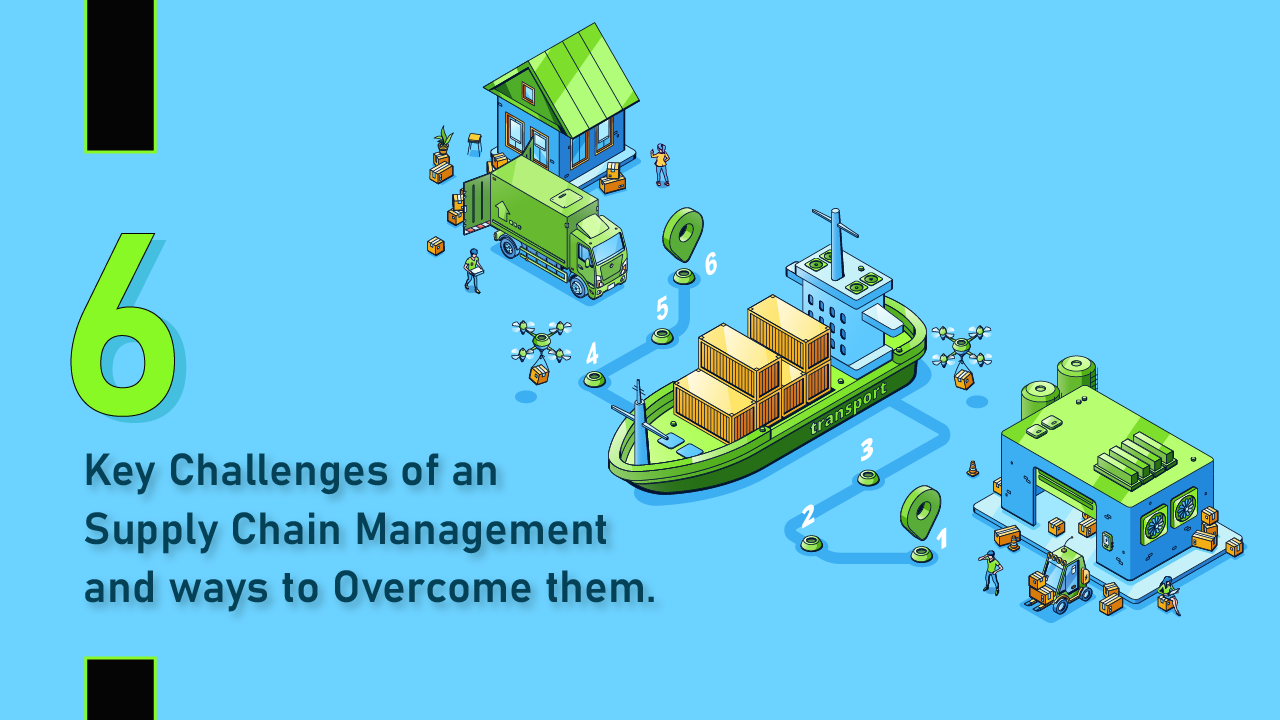Supply chain management (SCM) is a complex and multi-faceted process involving coordinating and managing the flow of goods, information, and finances from the origin to the end customer. While SCM has many benefits, including improved efficiency, customer satisfaction, and cost savings, it also poses many challenges.
Here are some of the main challenges organizations face in managing their supply chains effectively, along with a real-world example:
Complexity: With many suppliers, manufacturers, distributors, and customers involved, managing the flow of goods and information can be a humongous task if the approaches are not adequately administrated. For example, consider a clothing retailer that sources materials from multiple suppliers in different countries, manufactures the products in various factories, and distributes them to customers globally. Managing this complex network of suppliers, manufacturers, and distributors can be challenging, but ensuring a seamless flow of goods and information is essential.
Globalization: As supply chains became more global, with suppliers and manufacturers located worldwide, managing transportation, communication, and coordination has become increasingly intricate. Assume that there is a technology company that sources components from suppliers in Asia, Europe, and North America and manufactures its products in China. To ensure the timely delivery of products to customers, the company needs to manage the flow of goods and information across this global network of suppliers and manufacturers, which can be challenging but critical for its business operations.
Volatility: With the ever-ongoing trends, there will always be a change in consumer consumption demand, supply, and market conditions. These quick-altering market scenarios need effective planning to instigate automated and administered supply chain management. Let’s consider a food and beverage company that experiences sudden changes in demand for its products due to weather-related events or consumer trends. The company needs to be able to respond quickly to changes in demand and adjust its supply chain processes accordingly to ensure that it can meet customer demand promptly.
Risk management: Supply chain disruptions, such as natural disasters, political instability, supplier bankruptcies, or maybe a pandemic like the one the world faced a couple of years back, which disrupted the roots of entire human civilization, can have a significant impact on the supply chains and businesses. For example, consider a pharmaceutical company that relies on a single supplier for a critical raw material. A disruption at the supplier’s facility could significantly impact the company’s operations and ability to meet customer demand. Organizations need to be proactive in managing these risks to secure the continuity of their supply chain operations.
Expenses: To stay competitive in the forever challenging and transforming market landscapes, it is essential for the supply chains to balance their costs and service considerations along with all the overhead costs by cutting-down expenses wherever it is required. Finding ways to reduce costs while maintaining quality and delivery allows businesses to stay ahead of the competition.
Integration: Integrating different systems, processes, and partners in the supply chain can be complicated and time-consuming. Companies need to adopt productive ways to seamlessly integrate these different systems to ensure the coherent flow of goods and information.
In a short-summarized manner, effective supply chain management requires a combination of meticulous planning, collaboration, communication, and technology. Organizations need to continuously monitor and adjust their supply chain processes to overcome these challenges and meet the evolving needs of their customers.
There are many business tools in the current market, promising businesses ways to overcome all these challenges, and among these, Process Automation has become the wildcard new entree into the scope.
Process Automation has the potential to revolutionize the way businesses operate, making it possible to accomplish tasks faster and with greater accuracy. The trend towards automation is driven by the need to keep up with the demands of modern business environments and global market scenarios, where speed, efficiency, and accuracy are critical to success.
Complexity: With many suppliers, manufacturers, distributors, and customers involved, managing the flow of goods and information can be a humongous task if the approaches are not adequately administrated. For example, consider a clothing retailer that sources materials from multiple suppliers in different countries, manufactures the products in various factories, and distributes them to customers globally. Managing this complex network of suppliers, manufacturers, and distributors can be challenging, but ensuring a seamless flow of goods and information is essential.
Globalization: As supply chains became more global, with suppliers and manufacturers located worldwide, managing transportation, communication, and coordination has become increasingly intricate. Assume that there is a technology company that sources components from suppliers in Asia, Europe, and North America and manufactures its products in China. To ensure the timely delivery of products to customers, the company needs to manage the flow of goods and information across this global network of suppliers and manufacturers, which can be challenging but critical for its business operations.
Volatility: With the ever-ongoing trends, there will always be a change in consumer consumption demand, supply, and market conditions. These quick-altering market scenarios need effective planning to instigate automated and administered supply chain management. Let’s consider a food and beverage company that experiences sudden changes in demand for its products due to weather-related events or consumer trends. The company needs to be able to respond quickly to changes in demand and adjust its supply chain processes accordingly to ensure that it can meet customer demand promptly.
Risk management: Supply chain disruptions, such as natural disasters, political instability, supplier bankruptcies, or maybe a pandemic like the one the world faced a couple of years back, which disrupted the roots of entire human civilization, can have a significant impact on the supply chains and businesses. For example, consider a pharmaceutical company that relies on a single supplier for a critical raw material. A disruption at the supplier’s facility could significantly impact the company’s operations and ability to meet customer demand. Organizations need to be proactive in managing these risks to secure the continuity of their supply chain operations.
Expenses: To stay competitive in the forever challenging and transforming market landscapes, it is essential for the supply chains to balance their costs and service considerations along with all the overhead costs by cutting-down expenses wherever it is required. Finding ways to reduce costs while maintaining quality and delivery allows businesses to stay ahead of the competition.
Integration: Integrating different systems, processes, and partners in the supply chain can be complicated and time-consuming. Companies need to adopt productive ways to seamlessly integrate these different systems to ensure the coherent flow of goods and information.



